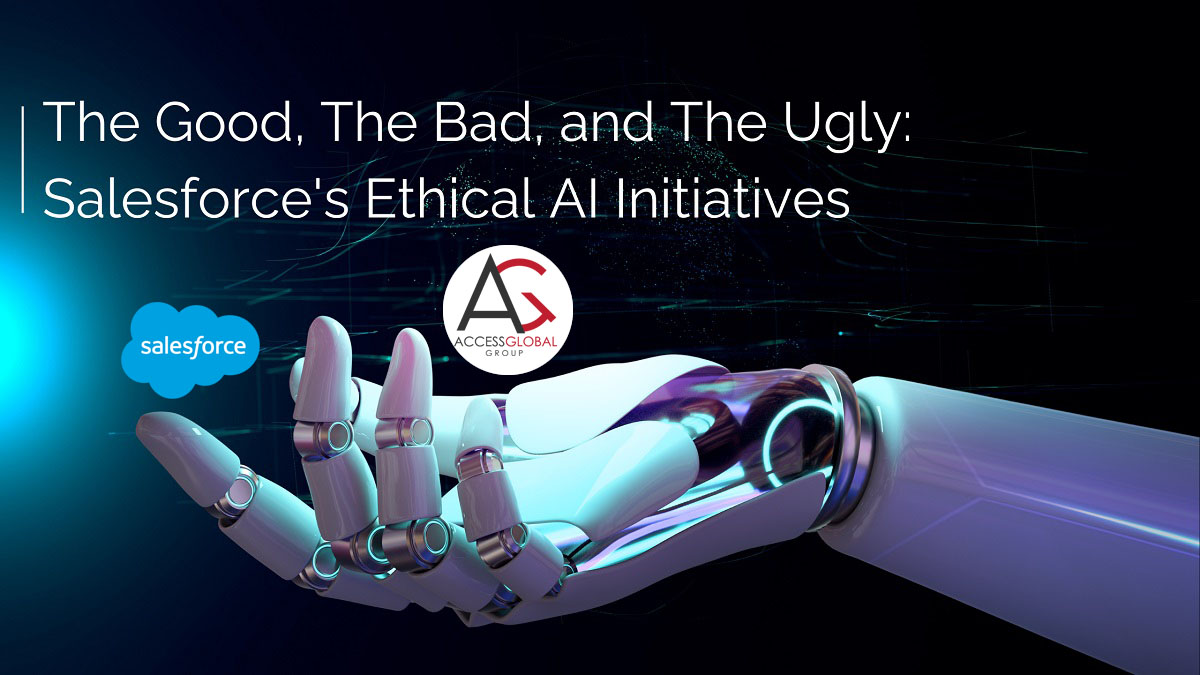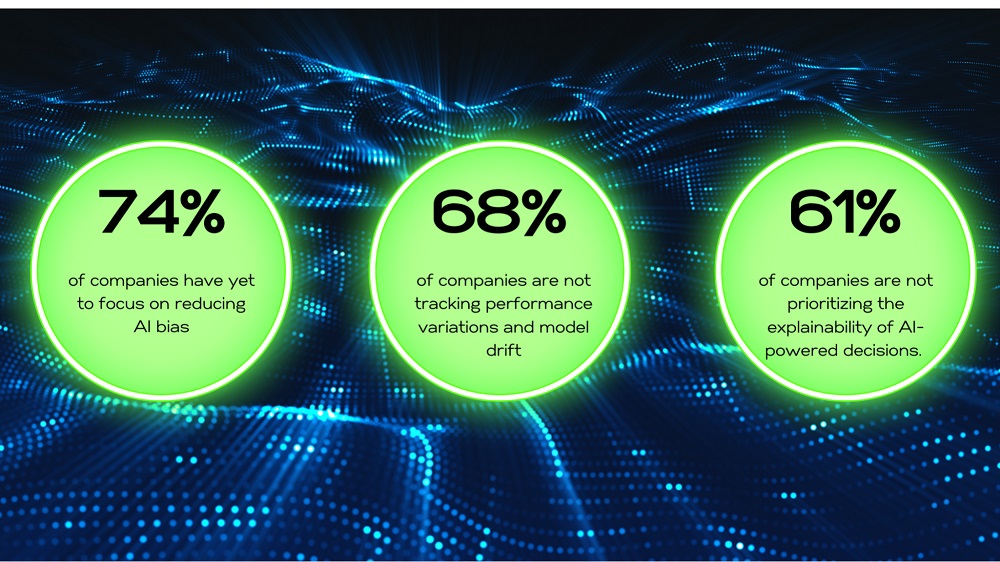The Good, The Bad, and The Ugly: Salesforce’s Ethical AI Initiatives
 Jenna Trott
Jenna Trott
5 min read | AUGUST 08, 2023

At its very core, Salesforce’s approach to AI is much like its approach to business in general. With core values of Trust, Customer Success, Innovation, Equality, and Sustainability, Salesforce positions itself as the front-runner of ethical AI initiatives. Join us as we embark on this journey of exploration, where the good, the bad, and the ugly of enterprise AI intertwine, and Salesforce’s ethical initiatives shine as a source of inspiration.

First, The Good –
Within this article, we cannot overlook the advantages that AI can provide and that many of us are already reaping the benefits of. Some of the key advantages include:
Creativity and Innovation: It can foster creativity by generating new ideas, designs, or content that humans might not have thought of. This can lead to innovative products, services, and marketing campaigns.
Content Generation: Easily produce content at scale, such as articles, product descriptions, social media posts, and even music and art, saving time and resources for content creation.
Personalization: Generative AI can easily create hyper-personalized experiences for customers by tailoring content and recommendations based on individual preferences and behavior patterns.
Simulation and Testing: Companies can leverage generative AI to simulate various scenarios and test different strategies without real-world consequences, helping to make more informed decisions.
Optimization: Easily optimize processes and workflows by finding the most efficient solutions to complex problems, improving resource allocation and cost-effectiveness.
Personal Assistants and Chatbots: Generative AI can power natural language processing applications, enabling the creation of virtual assistants and chatbots for fast and accurate customer support and service.
(These are just some of many!)
Generative AI, with its innumerable capabilities, is rapidly emerging as a transformative force. It acts as a catalyst for groundbreaking transformations, offering companies an unparalleled competitive edge and propelling industries toward a future of infinite potential. What could possibly go wrong?

The Dark Side of AI
Despite the insurmountable good that generative AI can bring about, there lie omnipresent issues that raise valid concerns for companies across all industries — particularly for those operating within domains of banking and insurance. As companies jump at the opportunity for AI to maximize efficiency and precision, there are looming ethical concerns and potential pitfalls which we must all be aware of.
One of the most pressing issues is the inadvertent propagation of biases within AI algorithms. In banking, loan approval processes driven by AI models can arbitrarily discriminate against certain demographics, leading to unfair lending practices.
Similarly, in the insurance industry, AI-driven underwriting and pricing models may unintentionally result in disparate impact, adversely affecting specific groups based on their characteristics or geographical location.
Moreover, the opacity of AI decision-making in these sectors creates challenges in holding algorithms accountable for their actions, leaving customers and regulators alike questioning the fairness and transparency of the choices made.

What Can Be Done?
All is not lost in the world of AI – tackling the negative consequences of AI is achievable with a multifaceted approach that involves collaboration among key stakeholders. Already we’re seeing companies invest in robust testing, validation, and auditing processes to ensure fairness and transparency. By incorporating diverse and representative data sets, they aim to reduce disparate impact and discriminatory outcomes. More specifically, the Innovation, Cybersecurity, and Technology (H) Committee at the National Association of Insurance Commissioners has committed itself to creating a space for state insurance regulators to discuss cybersecurity, innovation, data security, privacy protections, and emerging technology in the insurance industry. They keep track of developments in these areas and make sure regulators understand how they affect consumers, insurers, and the regulatory framework.
However, while there are some companies and organizations taking steps to mitigate the unintended consequences of AI — it is not nearly enough. With the widespread adoption of AI across various business lines, many companies are eager to embrace innovation. Nonetheless, it is important to recognize that some organizations may not be fully considering the ethical implications. Recent data suggests that a majority of companies have not yet implemented certain measures to ensure the trustworthiness and responsibility of their AI systems. For example, 74% have yet to focus on reducing bias, 68% are not tracking performance variations and model drift, and 61% are not prioritizing the explainability of AI-powered decisions. Companies must acknowledge these shortcomings and urgently implement robust measures to ensure ethical AI deployment for a more equitable and secure future.

What Salesforce is Doing Differently
In the bustling utopia of AI, Salesforce stands tall as a pioneering leader, championing a vision that transcends mere technological advancement. Beneath all the codes and algorithms, the heartbeat of a purpose-driven company exists, seeking to harness the boundless potential of AI while nurturing an ethical conscience.
The recent launch of Einstein GPT sparked both excitement and cautious anticipation about the ethical safeguards Salesforce would implement. Kathy Baxter, Principal Architect, Ethical AI Practice at Salesforce, promptly reassured everyone that trust is the cornerstone of every AI discussion within the organization. Kathy emphasized that customer data is not Salesforce’s product, underscoring the commitment to privacy and security. To propel AI into the next frontier responsibly, Salesforce has established five key priorities that will guide their journey forward:
- Accuracy
- Safety
- Transparency
- Empowerment
- Sustainability
What Sets Einstein GPT Apart?
In addition to being a leader in enterprise AI, Salesforce’s Einstein GPT is setting a new standard for trust and transparency in handling client data with utmost care. Understanding the critical importance of ethical AI practices, Salesforce is committed to safeguarding sensitive information and prioritizing customer privacy. With data masking techniques, Einstein GPT ensures that personal details are protected through the use of realistic yet fabricated alternatives, preventing the dissemination of sensitive personally identifiable information. This approach allows Salesforce users to create personalized messaging for clients without compromising data security.
How exactly does Salesforce do this?
Salesforce acknowledges the weight of responsibility and presents a remarkable solution through Einstein GPT’s “Trust Layer,” which encompasses the following features:
- Secure Data Retrieval
- Dynamic Grounding
- Data Masking
- Toxicity Detection
- Auditing
- Zero Retention
Before the final message is sent to the intended recipient, it undergoes rigorous testing to identify any potentially harmful or inaccurate content. This stringent evaluation ensures that the message meets the highest standards of quality. The entire process adheres to an exacting audit trail, fostering accountability and transparency.
The most commendable aspect of Einstein GPT is its zero retention policy for personally identifiable customer data. This ensures that all customer information is treated with the utmost responsibility, privacy, and ethical consideration, cementing Salesforce’s commitment to data protection and customer trust.

Get the latest Salesforce news
Subscribe to get the latest Salesforce blogs, guides, industry reports, events, and all things Salesforce related!
FREE Salesforce Assessment!
To demonstrate confidence in our ability as Salesforce Partners, we’re offering you the a FREE Salesforce Organizational Assessment.
Let's Get Started on Your Salesforce Project!
Salesforce
PLATINUM
PARTNER
Salesforce
APPEXCHANGE
G2
USER REVIEWS

